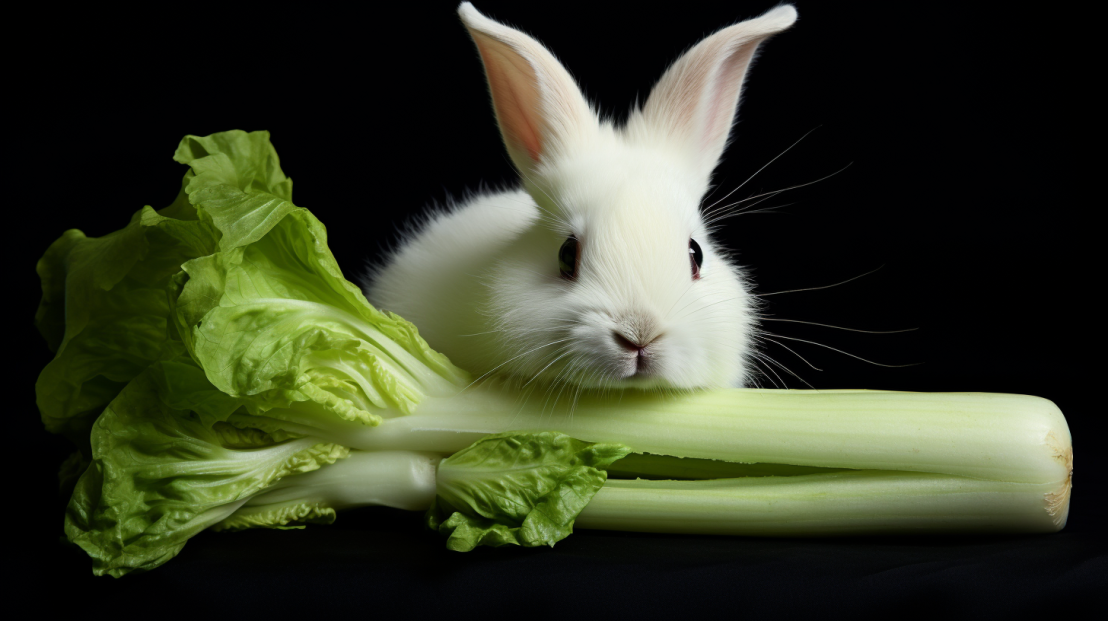The short answer is yes, it is safe for rabbits to eat celery, but it is best to introduce new foods slowly and over time. Read on to discover some of the key health benefits and tips for introducing celery to your rabbit!
Understanding a Rabbit’s Diet
Rabbits are popular pets known for their cute and fluffy appearance. As a responsible rabbit owner, it is crucial to provide them with a well-balanced and nutritious diet. Understanding what constitutes a healthy diet for rabbits is essential for their overall well-being. So, can rabbits eat celery? Let’s explore the dietary needs of rabbits and the role of celery in their nutrition.
The Importance of a Balanced Diet
Providing your rabbit with a balanced diet is crucial as it directly impacts their overall health. A proper diet helps maintain optimal weight, provides essential nutrients, supports the digestive system, and keeps their teeth in good condition.
Hay: The Staple Food for Rabbits
Hay is the most important component of a rabbit’s diet. It is rich in fiber, which helps maintain gut health, prevents hairball formation, and keeps their teeth properly worn down. The high fiber content in hay aids in digestion and prevents gastrointestinal issues that can be life-threatening to rabbits.
It is recommended to offer unlimited access to high-quality grass hay, such as timothy or orchard grass. The fiber in hay also encourages rabbits to chew, which is essential for their dental health.
Fresh Vegetables: A Source of Nutrients
In addition to hay, rabbits should be provided with a variety of fresh vegetables. These vegetables are a source of essential vitamins, minerals, and water. Incorporating fresh vegetables into a rabbit’s diet helps provide them with a diverse range of nutrients and supports their overall health.
Some examples of safe vegetables for rabbits include:
- Leafy greens: Romaine lettuce, kale, spinach, cilantro.
- Cruciferous vegetables: Broccoli, Brussels sprouts, cauliflower.
- Root vegetables: Carrots (in moderation), radishes, parsnips.
When introducing new vegetables to your rabbit’s diet, it is important to do so gradually and in small amounts. This allows their digestive system to adjust, and it helps you monitor their reaction to different types of vegetables.
The Role of Pellets
Pellets are another component of a rabbit’s diet, but they should be fed in moderation. Pellets can be a good source of concentrated nutrients, but they should not be the primary source of nutrition for rabbits. High-quality pellets that are specifically formulated for rabbits can be fed in small amounts to supplement their diet.
It is important not to exceed the recommended quantity of pellets to prevent obesity and other associated health issues.
Water: Essential for Hydration
Fresh, clean water should always be available to rabbits. Water is crucial for maintaining hydration and supporting various bodily functions. It is recommended to provide water in a bottle or bowl that is easily accessible to your rabbit.
Now that we have discussed the basic components of a rabbit’s diet, let’s explore the potential benefits and considerations when it comes to feeding rabbits celery.

The Benefits of Celery for Rabbits
Celery, with its crunchy texture and refreshing taste, is a popular vegetable among humans. But can rabbits eat celery too? Let’s explore the potential benefits of celery for rabbits.
1. Hydration Boost
Celery has a high water content, which can help keep your rabbit hydrated, especially during hot weather. Providing celery as a snack can be a refreshing way to ensure your rabbit gets enough fluids. However, it should not replace their primary source of water.
2. Dental Health
Chewing on celery sticks can promote good dental health for your rabbit. The fibrous texture of celery helps wear down their constantly growing teeth, reducing the risk of dental problems. The act of chewing celery also provides mental stimulation and helps prevent boredom.
3. Nutritional Value
While celery may not be as nutritionally dense as other vegetables, it still provides some essential vitamins and minerals. Celery is a good source of vitamin K, which is important for blood clotting, and vitamin C, an antioxidant that supports the immune system. It also contains potassium, which helps maintain proper cellular function, and folate, which is essential for cell growth and development.
To put it in perspective, here is a table showing the nutritional composition of celery:
| Nutrient | Quantity per 100g |
|---|---|
| Calories | 16 |
| Protein | 0.49g |
| Carbohydrates | 3.32g |
| Fiber | 1.6g |
| Fat | 0.16g |
| Vitamin K | 29.3µg |
| Potassium | 265mg |
| Folate | 36µg |
As you can see, while celery may not be a nutritional powerhouse, it still contributes some beneficial nutrients to your rabbit’s diet.
Part 3: Precautions and Moderation
While celery can offer some benefits, it’s crucial to be cautious and practice moderation when incorporating celery into your rabbit’s diet.
1. Introduction in Small Quantities
Introduce celery to your rabbit’s diet gradually and in small quantities. Start with a small piece and observe their reaction and digestion. If there are no adverse effects, you can offer celery as an occasional treat. This approach helps prevent any digestive upset or other health issues.
2. Observe for Any Negative Reactions
Monitor your rabbit closely after introducing celery to their diet. Watch out for signs of digestive upset, such as diarrhea or excessive gas. Rabbits have sensitive stomachs, and some individuals may have a harder time digesting celery than others. If you notice any adverse reactions, it’s best to discontinue feeding celery to your rabbit.
3. Balanced Diet is Key
Remember that celery should only be a small part of your rabbit’s overall diet. It should not replace other essential components, such as hay and a variety of fresh vegetables. Ensure that your rabbit’s diet is well-balanced, and that they receive the necessary nutrients from a diversity of foods. Hay should remain the primary component of their diet, supplemented with appropriate amounts of vegetables and pellets.
Now that we have covered the benefits and precautions of feeding celery to rabbits, let’s recap the most important considerations:
- Celery can provide a hydration boost and support healthy dental habits for rabbits.
- It offers some essential vitamins and minerals, but it should not be relied upon as the main source of nutrition.
- Introduce celery gradually and in small quantities to monitor your rabbit’s reaction and digestion.
- Always prioritize a well-balanced diet consisting primarily of hay, fresh vegetables, and appropriate pellets.
Remember, every rabbit is unique, and what works for one may not work for another. It’s always a good idea to consult with a veterinarian who specializes in rabbit care for personalized advice.
Frequently Asked Questions (FAQs)
Here are some common questions that rabbit owners often have about feeding celery to their furry friends:
Q: Can rabbits eat celery leaves?
A: Yes, rabbits can eat celery leaves, and they are safe for consumption. However, be sure to thoroughly wash the leaves before offering them to your rabbit.
Q: Can rabbits eat celery stalks?
A: Yes, rabbits can eat celery stalks. The crunchy texture of celery stalks provides mental stimulation and helps keep their teeth healthy.
Q: How often should I feed celery to my rabbit?
A: Celery should be given to rabbits as an occasional treat, rather than a regular part of their diet. Offering it once or twice a week is a good guideline.
Q: Are there any parts of celery that rabbits should not eat?
A: While celery is generally safe for rabbits, it’s best to avoid giving them the strings that can be found on celery stalks. These strings can be difficult to digest and may cause digestive issues.
Q: Can rabbits eat cooked celery?
A: No, rabbits should not eat cooked celery. Cooking alters the nutritional composition of celery and can make it difficult for rabbits to digest. Stick to offering fresh, raw celery to your rabbit.
Q: What are some other safe treats for rabbits?
A: Besides celery, there are other safe treats you can offer to your rabbit, such as small pieces of apple, banana, or berries. Always remember to introduce new foods gradually and in moderation.
Remember, the key to keeping your rabbit healthy is to offer a well-balanced diet, monitor their reactions to new food, and consult a veterinarian when in doubt.
Hey there, fellow nature enthusiasts! I’m Mark Gray, the passionate owner of OutdoorAnimals.com, a hub dedicated to uncovering the incredible world of outdoor animals. Whether you’re a hiker, a four-wheeler, or just someone who revels in the beauty of the great outdoors, you’re in the right place. I seek to understand all varieties of animals, from the great elk to the simple mouse, my goal is to write and share this knowledge with the public.

